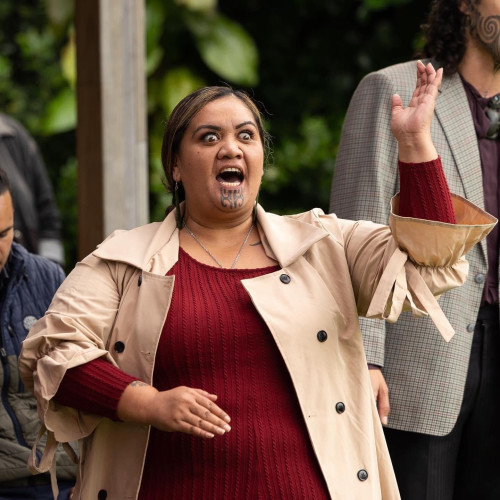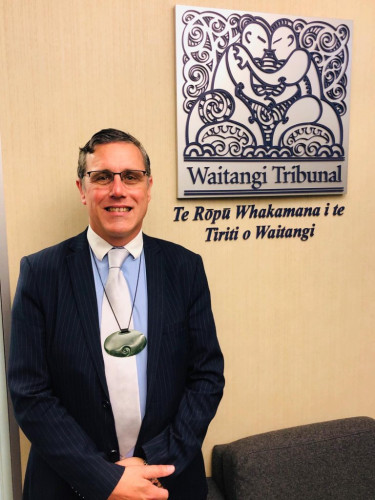The discussions of women speaking on the marae have existed for some time now.
Whaikōrero (formal speech) is mostly carried out by men but in some iwi, women take on the role of kaikōrero.
Re: News spoke to tikanga and mātauranga Māori ethicist Dr Karaitiana Taiuru (Ngāi Tahu, Ngāti Kahungunu, Ngāti Toa) and kura kaupapa Māori teacher Mahina Huata-Harawira (Ngāti Kahungunu) about why women don’t whaikōrero and if it’s sexist.


What is the history surrounding whaikōrero?
Karaitiana: Each iwi has its own protocols. It’s a way to show your oratory skills, and your knowledge of whakapapa, and connect to the other side.
Over the past few years, there have been discussions around women's speaking rights. Can you explain why women don’t whaikōrero?
Karaitiana: This is something that confused me for many years, so we do know the introduction of foreign religions was usually misogynist and the ethnographers who came to New Zealand were typically males who associated with those foreign religions.
So we know that a lot of our recorded histories and a lot of our mātauranga that’s been written down by those ethnographers have had that misogynist slant to it.
One of the stories that I’ve heard is that women used to be able to whaikōrero, whether that be in the marae or other places, and it was only since colonisation that they haven't.
Another story I’ve heard is that women can’t whaikōrero on the marae because of the gap between the two different pae (speaker’s seats) where the warrior spirits and atua are fighting and some people claim that it would be bad luck if a wahine Māori sat on the pae.
I know that Ngāti Porou let women speak on some of their marae.
In my opinion, it's most likely that it's due to colonisation why wāhine don't speak on the marae.
Some people might believe this is sexist and overlooks gender equality. What are your thoughts on this?
Karaitiana: I think in some instances, yes it certainly is sexist.
And I realise that I'm a man saying this but I also know there are a lot of the aunties and kuia around who firmly don't want to be on the pae (the speaker's seats).
They firmly believe that it's not their role and they don't want to be there. So I think I don't want to generalise but I do think in some instances, yes it’s sexist.
In other instances, it's probably mutual or misguided understandings.
Mahina: Some people believe a lot of things are sexist and that a lot of things overlook gender equality but I think that what people need to remember is that individualistic preferences don't necessarily determine general practices or traditions.
My thoughts on people expecting tikanga (traditions and customs) and kawa (marae protocol) to change for their personal beliefs, kei te he tera (that's wrong).
We believe in our tikanga and our kawa (traditions and customs) and we believe in the spiritual reciprocation of what we are saying on the marae.
For example, if a whole whānau or a whole hapū came together and had that discussion and altered it for themselves, pai tērā ki ahau (that's okay with me).
No, I don't think it’s sexist. I think at the end of the day it’s all about haumarutanga - safety.
Does this restriction apply to takatāpui people?
Karaitiana: I haven't really looked into this deeply but I think this discussion should be had.
Each marae should have their own discussions and set their own kawa (marae protocol) for this.
But I think we have to realise takatāpui existed before colonisation and it was normal pre-colonisation. And it is only post-colonisation that we seem to be divided about that area.
How do you think having people other than men whaikōrero could enhance the discourse on the marae?
Karaitiana: Speaking from experience, in Ngāi Tahu we have very limited kaumātua who can speak Māori. Most marae I go to, the people [who whaikōrero] are my age or younger and the younger generation have gone through kōhanga reo and kura kaupapa Māori.
I think the same rules apply for wāhine Māori, if wāhine Māori have the same skills as a male kaikōrero they should have the ability to whaikōrero to uplift the mana of the marae, and uplift the mana of the people.
What’s different if a wahine Māori has the right language skills, the right whakapapa knowledge, and the right mātauranga Māori?
I think that it will only enhance the people.
Anything to add?
Karaitiana: As different marae, I think we all need to sit down and evaluate what we think is tikanga and actually look and try to identify whether it's precolonial tikanga, or whether it’s been influenced by external religious beliefs and social structures.
I think people under the age of 40 are a lot more open-minded, a lot more inquisitive, and educated and it might be that the under-40s generations should be having these conversations. And the older generations should probably sit back and say, well, society’s changed.
It’s probably time to let the next generations become our leaders in te ao Māori and because we do run the risk that if we don't, we could end up just falling behind and being a detriment to our future Māori.
When your South Asian identity and queer identity don't feel compatible
"It’s still painful for me to revisit, because it was something that was supposed to be precious.”
New poll shows 60% of NZers agree government should call for ceasefire
Only 12% disagreed that there should be a ceasefire. The remainder were either neutral or unsure.
Empowering wāhine through connecting to the ocean
“It’s made everything even more deep and meaningful. You’re carrying an ocean inside you.”